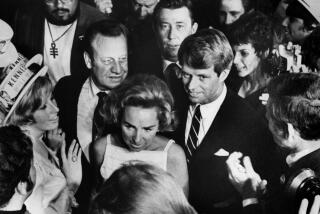Female General Retires, Praises Army’s Progress
- Share via
WASHINGTON — Lt. Gen. Claudia J. Kennedy, the highest-ranking woman in Army history, may be best known to the public for charging another general with sexual harassment. But in her retirement speech Friday, she offered no bitterness, instead praising the Army for leading American society toward “racial justice and gender equality.”
“These days the sound you hear overhead in the Army and at the Pentagon isn’t an airplane breaking the sound barrier,” she said to a crowd of several hundred people in the Pentagon courtyard. “It’s the sound of a glass ceiling being shattered, and the Army and the Pentagon are better because of it.”
Kennedy also called the Army one of the government’s “most effective institutions,” saying it has been “responsive” and “highly accountable” during her 31 years of service.
As the Army’s first female three-star general, Kennedy has received an unusual amount of media attention. But she has been in the headlines most prominently because of her recent allegation that Army Maj. Gen. Larry G. Smith improperly touched and tried to kiss her in a Pentagon office four years ago.
Army investigators recently substantiated Kennedy’s charge against Smith, and in the wake of that disclosure, Smith’s nomination to be the Army’s deputy inspector general was quietly withdrawn and another name was put forward. Smith continues to contest the allegation, officials have said. Even so, they expect him to receive a letter of reprimand sometime this summer and soon thereafter be told to retire. Neither Smith nor his lawyer returned calls Friday.
Kennedy didn’t refer directly to her charge against Smith during the retirement ceremony. But she appeared to allude to the Smith situation when discussing the state of women in the military. “It is completely reasonable that we fight for ourselves and for each other,” she said.
Overall, she said, the progress of women in the Army has been measured and steady since she enlisted in 1968. Alluding to an Army recruiting slogan, she said, “I can honestly tell you that I’ve been all I can be.”
Currently women make up about 15% of the military and of the Army, compared with about 10% in 1985. There are far fewer females among the top brass--there are only 11 women among the Army’s approximately 300 generals on active duty--but that is likely to change as women who joined during the all-volunteer era rise through the ranks.
Kennedy’s plan to retire was made well before her charge against Smith became public.
Kennedy didn’t indicate her plans, saying only that she intends to stay involved in the Army. But Army Secretary Louis Caldera was more effusive, suggesting that, among other things, Kennedy has a future in national politics.
More to Read
Sign up for Essential California
The most important California stories and recommendations in your inbox every morning.
You may occasionally receive promotional content from the Los Angeles Times.













